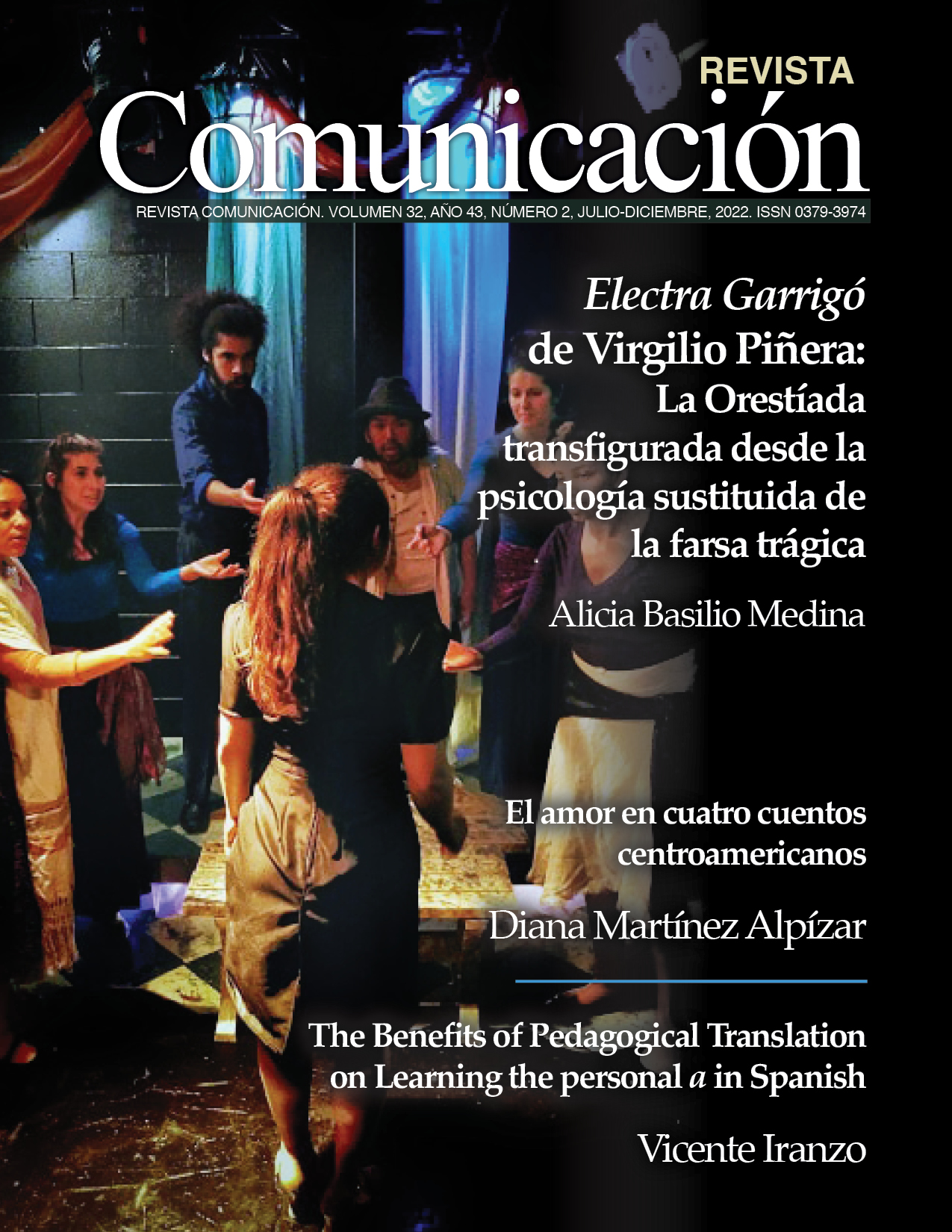Electra Garrigó by Virgilio Piñera: The Oresteia Transfigured from the Replaced Psychology of the Tragic Farce
Main Article Content
Abstract
The present work sustains that the dramatic piece Electra Garrigó by Virgilio Piñera retakes the tragic argument from the Atreides myth developed in Aeschylus’ hypotext to turn the communicative intention of the tragic genre and update it in a work of hybrid structure and development that contains formal elements that belong to farce. We will explore how one of the mechanisms in the farce dramatic subgenre operates in Electra Garrigó; i.e., the substitution psychology of the characters, which manifests itself when the psychic facts are moved from one character that should execute them to another character completely opposed and viceverse. As a result, there is a modification in the moods of the characters. Therefore, the myth is transvalued to reflect upon the family, the genesis of society: the Atreides core family becomes the personification of fundamental attitudes from the Cuban bourgeoisie and even of the whole humanity. The dynamics of the Atreides family, a relationship system from which Electra will redeem Orestes and will be emancipated, is established through the freedom evasion mechanisms described by Erich Fromm. Through its formal and thematic constitution, the drama expresses Piñeira’s social concerns derived from the Cuban Neo-colony.
Article Details
This work is licensed under a Deed - Atribución/Reconocimiento-NoComercial-SinDerivados 4.0 Internacional - Creative Commons.
Política de acceso abierto
Esta revista provee acceso libre inmediato a su contenido bajo el principio de que hacer disponible gratuitamente investigación al público apoya a un mayor intercambio de conocimiento global.
Ser una revista de acceso abierto, implica que todo el contenido es de libre acceso y sin costo alguno para el usuario o usuaria, o institución. Las personas usuarias pueden leer, descargar, copiar, distribuir, imprimir y buscar los artículos en esta revista sin pedir permiso previo del editor o el autor con fines educativos y no de lucro.
La única limitación de la reproducción y la distribución, y el único papel de los derechos de autor en este ámbito, debe ser dar a los autores el control sobre la integridad de su trabajo y el derecho a ser debidamente reconocidos y citados. (Budapest Open Access Iniciative)
LICENCIAMIENTO Y PROTECCIÓN INTELECTUAL
Todos los artículos publicados, están protegidos con una licencia Creative Commons 4.0 (Deed - Atribución/Reconocimiento-NoComercial-SinDerivados 4.0 Internacional - Creative Commons) de Costa Rica. Consulte esta licencia en: https://creativecommons.org/licenses/by-nc-nd/4.0/deed.es
Las licencias constituyen un complemento al derecho de autor tradicional, en los siguientes términos:
- Se impide la obra derivada (es decir, no se puede alterar, transformar ni ampliar el documento).
b. Siempre debe reconocerse la autoría del documento referido.
c. Ningún documento publicado en la Revista Comunicación, puede tener fines comerciales de ninguna naturaleza.
Mediante estas licencias, la revista garantiza al autor que su obra está protegida legalmente, tanto bajo la legislación nacional como internacional. Por tal motivo, cuando sea demostrada la alteración, la modificación o el plagio parcial o total de una de las publicaciones de esta revista, la infracción será sometida a arbitraje internacional en tanto que se están violentando las normas de publicación de quienes participan en la Revista y la Revista misma. La institución afiliada a Creative Commons para la verificación en caso de daños y para la protección de dichos productos es el Instituto Tecnológico de Costa Rica, mediante la Editorial Tecnológica y la Vicerrectoría de Investigación.
References
Bentley, E. (1985). La vida del drama. México: Paidós.
Carrió, R. (1988). Los dramaturgos de transición: una resistencia fundadora. Escenarios de dos mundos. Inventario teatral de Iberoamérica. Madrid: Centro de Documentación Teatral.
Fromm, E. (1969). Ética y psicoanálisis. México: FCE.
Fromm, E. (1989). El miedo a la libertad. México: Paidós.
Hernández, L. J. (1997). Beckett. Sentido y método de dos obras. México: UNAM, Facultad de Filosofía y Letras.
Ibarra, J. (1994). Un análisis psicosocial del cubano: 1898- 1925. La Habana: Editorial de Ciencias Sociales.
Knowles, J. K. (1980). Luisa Josefina Hernández: teoría y práctica del drama. México: UNAM.
Leal, R. (1988). 1902-1958: La República. En O. Harmony (Ed.), Escenarios de dos mundos. Inventario teatral de Iberoamérica (pp. 17-26). Madrid: Ministerio de Cultura de España.
Miranda Cancela, E. (1991). Electra en Piñera, Clássica. Revista Brasileira de Estudos Clássicos, 4, 203-213. Recuperado de https://revista.classica.org.br/classica/article/view/586
Pavis, P. (1984). Diccionario del teatro. México: Paidós.
Piñera, V. (1960). Teatro completo. La Habana: Ediciones R.
Piñera, V. (1994). Freud y Freud. En Consejo Nacional para la Cultura y las Artes (Ed.), Poesía y crítica (pp. 277-279). México: CNCA.

